Farmers around the world make commercial choices every season regarding the various tools that they will use to produce the best possible crops. Their choices depend on the seasons, the needs of their consumers and the given climatic and environmental conditions at the time of sowing and growing. Biotech crops are among those tools that farmers who work in countries without GM cultivation bans, can choose from.
More farmers are now planting genetically modified crops (GMOs) globally than all EU farmers put together, on a surface that is larger than the EU’s entire arable land. This reflects a conscious decision made by millions of farmers around the world each growing season to invest in seeds that provide them with clear returns on their investment, and help them contribute to environmental progress while sustaining consumer health and safety.
ABC welcomes ISAAA report into the use of biotech to help meet the challenges of a growing population and climate change
70 countries adopted biotech crops through cultivation and importation in 2018. Biotech crops can increase yields, improve resistance to pests, and reduce waste. ABC calls on the government to adopt science driven, proportionate regulation in agriculture to ensure UK farmers are able to benefit from these technologies.A new report by the International Service for the Acquisition of Agri-biotech Applications (ISAAA) has found that a total of 70 countries adopted biotech crops in 2018, to help meet UN Sustainable Development Goals including hunger, malnutrition and climate change. [...]
 13-06-2019 PRESS RELEASES
13-06-2019 PRESS RELEASES
Bt maize farming has enabled additional production of 1.89 million tons of maize between 1998 and 2018 in Spain and Portugal
13-06-2019 FACTSHEETS/INFOGRAPHICSBenefits of Bt maize farming in Spain and Portugal
 24-08-2018 REPORTS
24-08-2018 REPORTS
The EU Protein Gap: trade policies and GMOs
The EU’s new Common Agricultural Policy is expected to define an ambitious strategy to promote protein crops whilst reducing dependence on external sources. This new EuropaBio brochure highlights how trade of imported GM crops will remain vital for ensuring a sustainable supply of protein. Bridging the ‘protein gap’ will require non-discrimination in trade and investment in research and innovation at home. Read More
 26-06-2018 PRESS RELEASES
26-06-2018 PRESS RELEASES
Consumers and small farmers increasingly benefit from biotech crop adoption, show two new studies
June 26, 2018. Today, the International Service for the Acquisition of Agri-biotech Applications (ISAAA) and PG Economics, Ltd. released new studies highlighting the continued social, environmental and economic benefits of the global adoption of biotechnology in agriculture. [...]
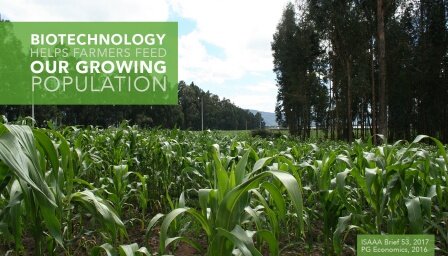 21-02-2018 REPORTS
21-02-2018 REPORTS
Cultivating the Future: How can 20 years of GM debate inform UK farm policy?
Cultivating the Future is a series of essays authored by leading plant scientists, academics, trade bodies and politicians, celebrating numerous breakthroughs in plant technology and pioneering new approaches to food and farming since the first commercialisation of GM crops over 20 years ago. [...]
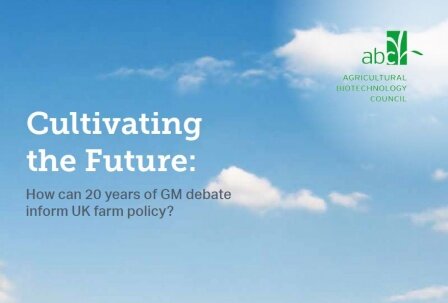 26-11-2014 VIDEOS
26-11-2014 VIDEOS
Prof. Luis Herrera-Estrella, National Laboratory for Genomics, Mexico
Opposition to technology is not based on real arguments, and those convening such misleading information should be aware of the consequences of their action.
27-10-2014 VIDEOSDrought Resistant Corn
With the use of biotechnology, corn can be modified to better withstand periods with less water by limiting effect of drought conditions on its yields.
25-07-2014 REPORTSSustainable intensification of European agriculture
The concept of sustainable intensification has come into prominence in the context of global food security.
25-07-2014 REPORTSSustainable intensification of European agriculture
The concept of sustainable intensification has come into prominence in the context of global food security.
04-04-2014 VIDEOSPrincess Anne, United Kingdom
Princess Anne explains why she supports genetically modified crops - despite her brother Prince Charles being an outspoken opponent of them.
25-03-2014 VIDEOSGenetic Tinkering can be a Lifesaver
The London Free Press - The man widely credited with helping start the movement against genetically modified foods, only to become the planet's most vocal GM food proponent, says it may be the best hope for a world struggling to feed itself.
09-03-2014 VIDEOS''How an Environmentalist Changed his Mind about GM''
Transgenic crops are green: ''How an environmentalist changed his mind about biotechnology" was the sixth lecture of the International Seminar "Transgenic Crops: Reality and Controversy" held in Chile in 2014, by the Ministry of Agriculture.
19-02-2014 VIDEOSChestnut Project Small Stem Assay Timelapse
Can #biotechnology save the mighty American Chestnut Tree from blight? First stages seem to show success!
24-01-2014 VIDEOSBBC Interview with Johnathan Napier
Johnathan Napier appeared on the Today (c. 53 mins) programme to discuss the new trials. He discussed the need and benefits of the technology, and highlighted that a dialogue between researchers and the public is key.
01-01-2014 FACTSHEETS/INFOGRAPHICSBiotech benefits
Biotech has increased crop production, lowered CO2 emmissions and improved farm incomes by $133 billion since the first varieties were planted in 1996.
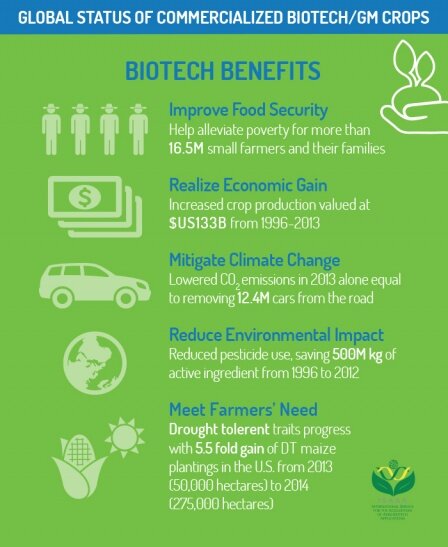 01-01-2014 VIDEOS
01-01-2014 VIDEOS
GMOrganic, a Botanical Love Story
It seems like their professions put them on opposing sides of agriculture, but UC Davis Professor Pamela Ronald and her husband, Organic Farmer Raoul Adamchak, share a vision: they believe genetic engineering is a tool to make farming more sustainable.
19-12-2013 VIDEOSGod Made vs GMO Food
What's the difference between god-made food and man-made food? More than you think!
21-11-2013 VIDEOSVideo: How is climate change affecting soil and yields in Ghana?
B4FA Media Fellow Adelaide Arthur (Joy News, Ghana) finds that a new report states that Ghanaian maize farmers could lose over 40% of their crop yields due to climate change.
20-06-2013 VIDEOSMore GM Crops Means more Nature Reserves
Owen Paterson has said that using GM will make use of farm land and “free up space for biodiversity, nature and wilderness”.
21-02-2013 VIDEOSBiotech Crop Countries 1996 - 2016
This video summarizes biotech’s success since its first commercialization in 1996 to 2016.
15-02-2013 VIDEOSBt Maize and Bees
Does genetically modified Bt maize pose a risk to honeybees? Stephan Härtel and his team at the University of Würzburg investigated this possibility in a three-year research project. They did not find that Bt maize affected the bees' health in any of these experiments.
09-02-2009 REPORTSMaking Sense of GM
Sense about Science: In the guide scientists and agriculturalists explain what is the genetic modification of plants and why scientists are doing it, putting GM into the context of developing plant breeding.
Highlights
-
Dual-purpose cotton to tackle malnutrition gets FDA approval
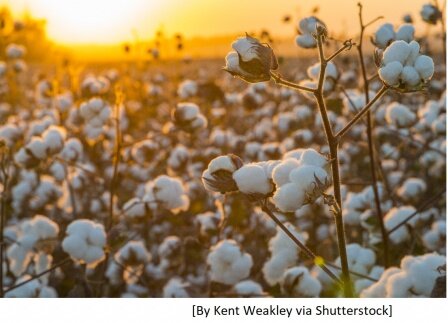
-
ABC welcomes ISAAA report into the use of biotech to help meet the challenges of a growing population and climate change

-
Pro-GMO chocolate to the rescue
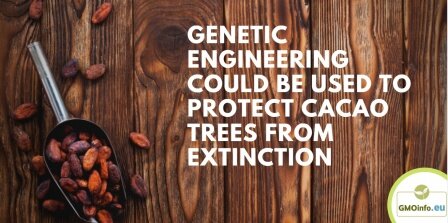
-
Faces of farming highlight the opportunity for agriculture post-Brexit
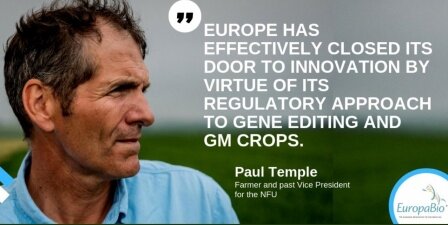
-
What we gain from innovation
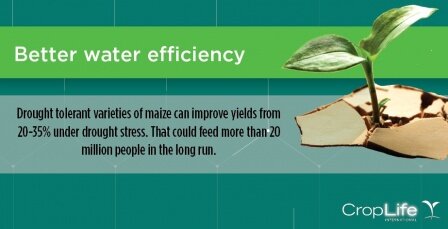
The GMOinfo website is a pan-European initiative supported CropLife Europe and partners from across Europe, to provide factual information about GMOs to Europeans in their own language.